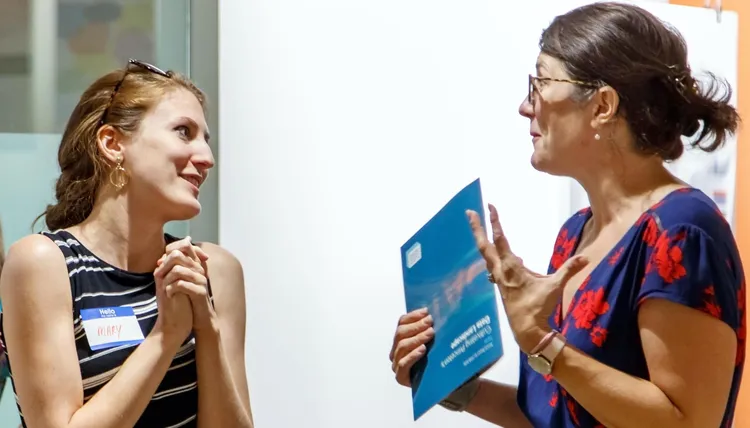How We Manage: Grad PMs Play Critical Role on Project Teams
25 January 2021
Wonder what’s new with one of our large-scale research partnerships?
Ask the graduate student project manager (PM).
Currently, two graduate students – Stephanie Luescher and Mary Naydan — serve as PMs for our multi-year research collaborations; some smaller scale projects, such as those supported by dataset curation grants, also have PMs.
Luescher, a second-year Ph.D. student in Near Eastern Studies, has been PM of the CDH-Princeton Geniza Project research partnership (CDH-PGP) since it launched this summer. In March, she will hand over the title to fellow NES graduate student Rachel Richman, who will also succeed her as a CDH Project Management Fellow.
The Fellowship, which is renewable, provides a graduate student with a stipend for six months. The Fellow is expected to devote five to ten hours per week to the role.
“Our PM Fellowship program is the best example of where the CDH's commitment to graduate students' professional development meets our commitment to research mentorship,” said CDH Project and Education Coordinator Rebecca Munson. “It provides recipients with the chance not only to explore a research field in-depth, but also to learn highly transferable skills that can be applied to dissertation writing, traditional and less traditional academic careers, and professional opportunities outside of academia.”
Naydan, a fifth-year Ph.D. candidate in English, has served as PM of the Princeton Prosody Archive (PPA) since 2018. A veteran PM, Naydan also acts as Senior Project Management Fellow at the CDH, where she provides mentorship to new PMs.
For Naydan, the role of PM is an intellectual exercise—literally. As she puts it, project management requires “keeping the big picture in mind while attending to the nitty-gritty detail. It requires a lot of mental energy and elasticity!”

Mary Naydan (left), project manager of the Princeton Prosody Archive (PPA), talks to Meredith Martin (right), PPA project director and faculty director of the CDH.
Although these skills remain important for all PMs, the details of the work vary by project—and by project stage. Luescher, who works on a project currently in development, describes herself as a “link” between the CDH team, headed up by Lead Developer Rebecca Sutton Koeser, and a team of researchers led by Marina Rustow, Khedouri A. Zilkha Professor of Jewish Civilization in the Near East.
“My main tasks are organizing meetings—setting up agendas, facilitating, taking notes—keeping track of where we are in the development process, thinking about workflows and the best way to get things done,” Luescher explained.
Naydan said that in her early days as PM, she likewise “liaised between the Project Director and the CDH.” Moreover, she “worked with the development team as an acceptance tester and design tester to build the [PPA] site”—which she remembers as a “favorite part of the job.”
“I love working with others and testing code to help build new features. It's fun to think through all of the possible scenarios that the code should account for.”
Naydan’s role changed as the project developed. When the PPA’s new site launched in March 2019, Naydan developed her skills in publicity and event-planning. Since then, she has been involved in a wide range of tasks, including working with partners at HathiTrust and Gale Cengage, managing the PPA site content, presenting at conferences, and supervising new researchers who join the team.
“I especially love mentoring the undergrad interns!” she said.
The PM position has also given Naydan and Luescher an opportunity to work closely with their advisor on a project different from traditional dissertation research and writing. Naydan said she “gravitated toward the CDH” in part because of her relationship with advisor Meredith Martin , who is both Faculty Director of the CDH and Project Director of the PPA.
“The PM role with the Princeton Prosody Archive seemed like a great way to pursue my interest in using technology to extend the reach and possibilities of traditional literary scholarship,” she said.
The PM experience has also served as important professional development for Naydan and Luescher, providing hands-on work experience and insight into a range of career possibilities.
“I have learned to be more organized, to think through processes to create workflows, to assign and guide other people in their tasks, and much more,” Luescher explained. “I also learned that working at a center for Digital Humanities or part of a digital humanities team would absolutely be something that I am open to once I conclude my Ph.D.”

Members of the Center for Digital Humanities-Princeton Geniza Project team meet via Zoom.
Naydan credits her work as PM for giving her “experience in so many different fields, from web development and data cleaning to event planning and administration.”
“I remember attending a workshop by Career Services, and they gave us a checklist of transferable skills like organization, problem solving, communication, team building, leadership, data analysis, collaboration,” she recalled. “I was able to check off nearly every box solely thanks to the PM role.”
When asked what she would tell other graduate students considering the role, Naydan emphasized the importance of the PM’s “own ideas and perspectives.”
“It's important to know that you're not just an executor of the Project Director's will, but an active, shaping force in the project,” she said. “Taking initiative to offer your own ideas and perspective is key!”
And what is Luescher’s advice to prospective graduate student PMs?
“Do it.”
[Author’s note: I am currently closing out my time as PM of the Shakespeare and Company Project, a position I took up as postgraduate research associate at the CDH. I highly recommend the role, as well!]